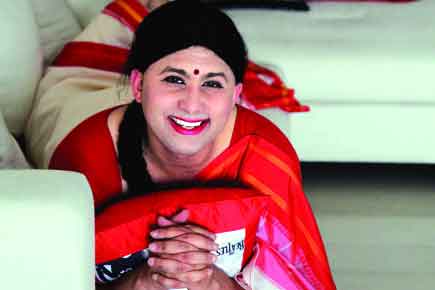As actor Farhad Colabavala single-handedly enacts six characters on the stage in Kasturba Panda Ki Pantie, director Madhav Mehta tells Chahak Mittal why this aspect did not majorly become a challenge, rather gave more layers to the play
In a red-bordered white-coloured saree, with a large maroon bindi adorning his forehead, Farhad Colabavala plays a demure ‘Aunty Ji’ for a while, then switches over to being a man, performing animated stunts, flirting with other males and even faking an orgasm. In the process, the actor challenges all notions of gender politics and cliches and drives home the point of the satirical play, Kasturba Panda ki Pantie. It was the summer of 2012 when the idea of presenting a solo show through theatre birthed in theatre actor and director Madhav Mehta’s mind.
As the duo is set to re-present the play at Akshara Theatre, seven years after its first presentation, Madhav tells us why he kept it as a one-man show, who plays all the six characters in the plot. “I thought it could be a very fun element to the play. Farhad and I have been working together since 2007. And it was just one random evening when I got this idea that ‘What if I do the play only with him in it?’ It was a new idea but this is why we worked hard to make it work out.”
The play, an adaptation of Carl Sternheim’s 1910 German satire Die Hose, revolves around the story of Kasturba, a frustrated wife of a failed businessman and a compulsive gambler, Ranjan Panda, who has rented out his Sundar Nagar Apartment to recover his monetary losses. However, the flat fails to attract prospective tenants. When Bollywood actor Salman Khan is poised to make an appearance at Sundar Nagar’s Diwali Mela, Kasturba, a die-hard Sallu fan, rushes to the fair. She becomes the talk of the town, as she stretches on her tiptoes to catch his glimpse, when her underpants accidentally slip off. Chaos follows. In a matter of minutes, the number of parties ‘interested’ in taking up Ranjan’s rental apartment offer skyrockets.
The director says that the plot is a farce on chauvinism and a conservative value system that tries to confine women to particular roles in the society. Her husband, a stereotypical chauvinist, “is actually surprised when all of a sudden tenants start to come on board after the incident.”
Farhad explains that the protagonist being Kasturba, he wears the saree throughout the play and enacts six other roles (all of men) in the same attire. “It’s perpetually funny and interesting that there are more males in the play and only one female. Yet the costume remains that of a woman’s, symbolically highlighting that she is the first who questions stereotypes. Enacting all the characters was indeed a challenge but it did turn out to be a lot of fun.”
But this, he says, did not only involve acting skills but a lot more other things. “There is voice modulation as I have to keep changing my voice with every character. I remember, in my school, at inter-school drama competitions, I used to engage in acts where I had to portray more than one character and change my voices. So it was like revisiting the old days. We also had to keep a check on the body language, which again changes with the characters. It’s different for a man and a woman.”
Talking about the focus, in both the title and the plot, on the particular garment — underpants — how did they make it appear to be satirical and funny and not awkward or vulgar for the audience? Madhav says, “He was a man at the end of the day. Even though the audience looks at him as a woman in the play and not think about the truth in his real life, it still is just a story with an aim. And this aspect that he plays all the six characters by himself is the very reason why the play has so many layers to it even when it has only one man on the stage.”
Farhad, on the other hand, says, “This very part of the play is its funniest aspect. And we have worked hard to make it not look weird to the audience. The story was originally inspired by the German and European culture. But here, in India, we contextualised the Indian society and how a woman operates when surrounded by a group of over- and ever-dominating conservative males.”
(The play will staged on June 26 to 29 and July 3 to 7 at 7:30 pm at Akshara Theatre.)


























